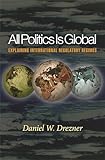All politics is global : explaining international regulatory regimes / Daniel W. Drezner ; with a new afterword by the author.
Material type: TextLanguage: English Publication details: Princeton, N.J. : Princeton University Press, 2007.Description: xx, 234 pages : illustrations ; 24 cmISBN:
TextLanguage: English Publication details: Princeton, N.J. : Princeton University Press, 2007.Description: xx, 234 pages : illustrations ; 24 cmISBN: - 9780691096421 (paperback)
- 0691096422 (paperback)
- 341.2
- JZ 1318 D778a 2007
| Item type | Current library | Home library | Collection | Shelving location | Call number | Copy number | Status | Date due | Barcode |
|---|---|---|---|---|---|---|---|---|---|
 Libro
Libro
|
Biblioteca Juan Bosch | Biblioteca Juan Bosch | Ciencias Sociales | Ciencias Sociales (3er. Piso) | JZ 1318 D778a 2007 (Browse shelf(Opens below)) | 1 | Available | 00000132697 |
Browsing Biblioteca Juan Bosch shelves, Shelving location: Ciencias Sociales (3er. Piso), Collection: Ciencias Sociales Close shelf browser (Hides shelf browser)

|

|

|

|

|

|

|
||
| JZ 1318 D568o 2002 Las organizaciones internacionales / | JZ 1318 D599g 2007 Global modernity : modernity in the age of global capitalism / | JZ 1318 D668h 2009 Huella ecológica y desarrollo sostenible / | JZ 1318 D778a 2007 All politics is global : explaining international regulatory regimes / | JZ 1318 D861t 2013 Trois espaces de protestation : France, Canada, Québec / | JZ 1318 E58g 2007 Globalization and militarism : feminists make the link / | JZ 1318 E77 2006 Espacios globales / |
Includes bibliographical references and index.
Bringing the great powers back in
A theory of regulatory outcomes
A typology of governance processes
The global governance of the internet
Club standards and international finance
Rival standards and genetically modified organisms
The "semi-deviant" case : trips and public health
Has globalization diluted the power of national governments to regulate their own economies? Are international governmental and nongovernmental organizations weakening the hold of nation-states on global regulatory agendas? Many observers think so. But in All Politics Is Global, Daniel Drezner argues that this view is wrong. Despite globalization, states especially the great powers still dominate international regulatory regimes, and the regulatory goals of states are driven by their domestic interests. As Drezner shows, state size still matters. The great powers the United States and the European Union remain the key players in writing global regulations, and their power is due to the size of their internal economic markets. If they agree, there will be effective global governance. If they don't agree, governance will be fragmented or ineffective. And, paradoxically, the most powerful sources of great-power preferences are the least globalized elements of their economies. Testing this revisionist model of global regulatory governance on an unusually wide variety of cases, including the Internet, finance, genetically modified organisms, and intellectual property rights, Drezner shows why there is such disparity in the strength of international regulations.
English


There are no comments on this title.